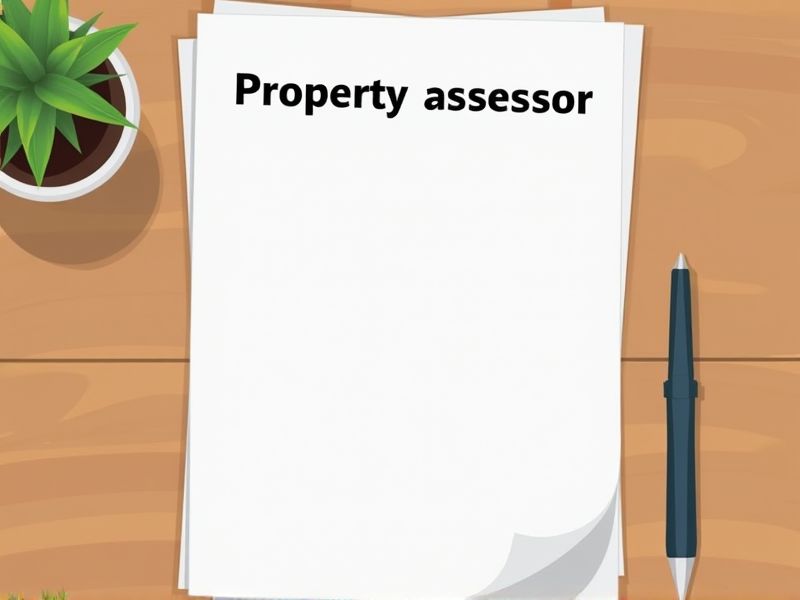
Property assessors require certain certifications to ensure they possess the expertise needed to accurately evaluate property values. These certifications verify an assessor's ability to apply proper valuation methods and adhere to industry standards. They also provide a framework for understanding legal guidelines and fiscal implications related to property assessments. Here's a list of vital certifications that serve as prerequisites for property assessors.
Certified Real Property Assessor (CRPA)
A Certified Real Property Assessor (CRPA) ensures property assessments are conducted with standardized methods, leading to fair taxation. Their certification verifies that they possess the technical knowledge crucial for accurate property valuation, which is essential in varying real estate markets. Inconsistent assessments can lead to financial disparities, so CRPAs play a crucial role in maintaining equitable community funding. Their expertise reduces disputes over property taxes, fostering community trust in local governance and property taxation systems.
Certified Residential Real Estate Appraiser
Certified Residential Real Estate Appraisers establish accurate property valuations, ensuring fair property tax assessments. Inaccurate appraisals can lead to significant revenue losses for local governments, impacting public services. Lenders and buyers rely on appraisers to determine a property's true market value, minimizing financial risk. Their expertise also mitigates potential disputes between property owners and tax authorities.
Certified General Real Estate Appraiser
A Certified General Real Estate Appraiser offers an authoritative valuation of complex properties, supporting accurate property assessments. Their expertise ensures that tax assessments are based on precise and reliable property values. Local governments rely on their assessments to maintain equitable tax distributions among property owners. Inaccurate appraisals can lead to disputes and financial discrepancies, making the Certified General Appraiser's role crucial in upholding transparency and fairness.
Licensed Real Estate Appraiser
A licensed real estate appraiser provides accurate and unbiased property valuations needed for tax assessments. Their expertise ensures property values are in line with current market trends, preventing potential disputes. Accurate valuations help local governments fairly distribute property taxes, impacting community funding. Their assessments also support equitable taxation and ensure compliance with legal standards in property assessment processes.
Certified Property Tax Specialist
Certified Property Tax Specialists possess specialized knowledge that ensures accurate property valuations, which leads to fair taxation. Property assessors benefit from their expertise in navigating complex tax regulations, avoiding potential legal issues. Accurate assessments prevent revenue loss for local governments by maximizing compliant tax collection. These specialists also enhance public trust by reducing disputes and increasing transparency in the assessment process.
National Assessor's Certification (NAC)
The National Assessor's Certification (NAC) is needed to ensure that property assessors have a standardized level of skill and knowledge across the industry. Consistent assessment practices lead to accurate property valuations, impacting property taxes and municipal revenue. Certification provides credibility and trust between assessors and property owners, fostering transparency in property-related financial decisions. A certified assessor can help reduce discrepancies in property tax assessments, minimizing disputes and appeals.
Appraisal Institute MAI Designation
Holding the Appraisal Institute MAI Designation signifies a higher level of professional competence, directly influencing credibility in property assessments. This designation often results in more accurate property valuations, which can affect real estate transactions and tax assessments. Clients and stakeholders tend to trust assessors with the MAI Designation due to its rigorous education and ethical requirements. Having this designation can lead to expanded career opportunities and the ability to handle more complex appraisal assignments.
Geographic Information Systems Professional (GISP)
The adoption of a Geographic Information Systems Professional (GISP) enhances the accuracy of property assessments by enabling precise spatial analysis and data integration. GISPs facilitate efficient management of large geographic datasets, which streamlines property valuation and tax assessments. The expertise of a GISP improves visualization of property boundaries and characteristics, aiding assessors in identifying discrepancies and undervaluations. Incorporating GIS technology enables assessors to make data-driven decisions and maintain up-to-date property records.
Certified Real Estate Analyst (CREA)
Certified Real Estate Analysts possess the specialized knowledge necessary to accurately evaluate property values, which aids property assessors in making informed decisions. Their expertise in market trends and financial analysis equips assessors with comprehensive data to ensure fair property taxation. This certification also enhances credibility, promoting trust among property owners and stakeholders in the assessment process. By integrating advanced analytical skills, CREA professionals contribute to more precise and equitable property assessments.
Property Valuation and Assessment Expert Certification (PVAEC)
Achieving the Property Valuation and Assessment Expert Certification (PVAEC) equips property assessors with advanced skills and updated methodologies, enhancing their appraisal accuracy. This certification demonstrates specialized knowledge in property valuation, thus increasing trust and credibility among clients and stakeholders. Regulatory compliance demands precise valuation practices; the PVAEC provides assessors with a comprehensive understanding of these standards. As the real estate market evolves, certified professionals can adapt to market trends, ensuring consistent, reliable property assessments.
Summary
When you pursue certifications as a property assessor, your expertise and credibility in the field will likely increase. Acquiring these credentials often leads to enhanced job prospects and potential pay raises. Certification may allow you to perform more accurate property valuations, thereby reducing errors and disputes. Organizations often prefer certified assessors, which can augment your career growth and professional reputation.
